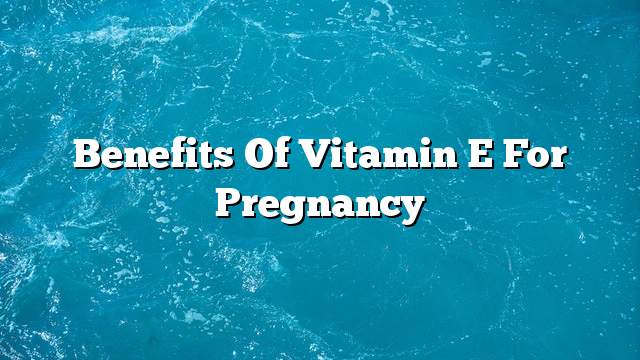I will start this article with a general overview of vitamin E by mentioning its benefits and harmful effects and its presence in food and other, for the adult, and then touch the privacy of pregnancy and the effect of this vitamin.
It is a fat-soluble vitamin, which is an antioxidant, it prevents the oxidation of unsaturated fatty acids in the body.
It is important to be anti-oxidant (it prevents the oxidation of fatty acids in cells). When acids are oxidized in red blood cells, for example, the membrane of the cell is destroyed and decomposed and thus leads to the decomposition of the red blood cell itself. But the focus of commercials for skin lotions is usually on its importance in the skin cells, its renewal and freshness, and it’s also important in being antioxidant.
The first risk is the lack of red blood cell decomposition as I mentioned earlier, where anemia and anemia symptoms, and affects other cells in the body, including skin and skin. If the deficiency continues for long periods without treatment, the effect of the heart cells and weaken the heart muscle, and the retina to the spinal cord and others.
For each vitamin in the daily diet a minimum should be consumed and a higher limit should not be increased, and there are symptoms of the increase as there are symptoms of deficiency, and in the present era where many people take tablets vitamins and supplements without a clear reason (without consulting a doctor) The top symptoms of vitamin E may be toxic to the person, such as it affects blood clotting. Therefore, it is recommended that the person who takes the blood can not take large amounts of vitamin E so as not to get bleeding.
Vitamin E is found in vegetable oils such as olive oil (remember, as I said, it is a fat-soluble vitamin). It is also found in seeds and in nuts such as cashews, egg yolk and green leafy vegetables such as spinach.
I would like to point out here that vitamin E deficiency and deficiency are rare. It is most likely that the individual gets what he needs from his normal daily diet. He is present in our food in his natural and ideal proportions, thanks to God.
Now, in pregnancy, there is concern about the privacy and sensitivity of pregnant women to vitamin E, some studies have shown that increasing the heart problems in the child is born, so it is not recommended that the pregnant woman to choose the tablets and supplements from the pharmacy without consulting a doctor. Usually a doctor will only give pregnant women folic acid and vitamin D, unless the need for another dietary supplement.
Vitamin E is useful for pregnant women and is present in a lot of balanced daily food, and there is no fear of deficiency or increase in rare cases, and the doctor should diagnose these cases to examine blood and body ratios.
Vitamin E is also useful for fertility (the ability to carry). As previously mentioned, it is anti-oxidant and therefore responsible for regenerating cells and preserving them from damage and oxidation, thus preserving the overall health of the body and the immune system. Before pregnancy, a woman may take dietary supplements containing vitamin E but during pregnancy, only folic acid and vitamin D are given.
